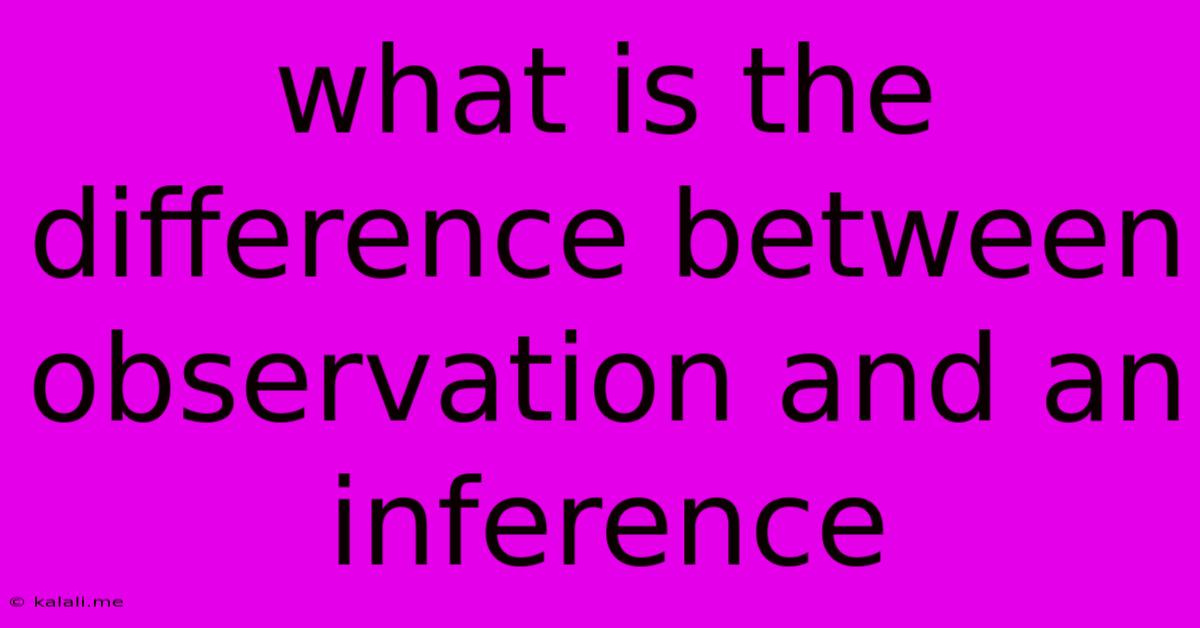What Is The Difference Between Observation And An Inference
Kalali
Jun 13, 2025 · 3 min read

Table of Contents
Observation vs. Inference: Unlocking the Power of Scientific Thinking
Understanding the difference between observation and inference is crucial, not just for scientists, but for anyone striving to think critically and solve problems effectively. This article will clearly define both terms, highlight their key differences, and provide examples to solidify your understanding. Learn to differentiate between what you see and what you conclude, and significantly improve your analytical skills.
Observations are the foundation of scientific inquiry. They are factual, objective descriptions of what is perceived through the five senses – sight, hearing, smell, taste, and touch. They are directly verifiable and repeatable. Inferences, on the other hand, are interpretations or conclusions drawn from observations. They go beyond the immediately available data and involve a degree of speculation or deduction.
What is an Observation?
An observation is a direct sensory experience that can be objectively verified. It’s about recording what you see, hear, smell, taste, or touch without adding your own interpretation or judgment. Key characteristics of an observation include:
- Objectivity: Observations should be free from personal bias or preconceived notions.
- Measurability: Whenever possible, observations should be quantified using tools and units of measurement.
- Repeatability: Another observer should be able to make the same observation under similar conditions.
- Specificity: Observations should be detailed and precise, avoiding vague or ambiguous language.
Examples of Observations:
- "The liquid is clear and colorless."
- "The plant is 15 centimeters tall."
- "The metal feels warm to the touch."
- "The bird is singing a melodious tune."
What is an Inference?
An inference is a logical conclusion or interpretation based on observations and prior knowledge. It’s a mental leap beyond the directly observable facts. Inferences can be accurate or inaccurate, depending on the validity of the observations and the reasoning process.
Characteristics of an Inference:
- Subjectivity: Inferences are influenced by the observer's background, experiences, and beliefs.
- Interpretation: Inferences involve making sense of observations by connecting them to existing knowledge or theories.
- Probability: Inferences are often expressed in terms of probability or likelihood, rather than certainty.
- Testability: While not directly observable, inferences can be tested through further investigation and experimentation.
Examples of Inferences:
- Observation: "The ground is wet." Inference: "It must have rained recently."
- Observation: "The leaves on the tree are changing color." Inference: "It must be autumn."
- Observation: "The child is crying." Inference: "The child might be hurt or upset."
The Key Differences Summarized
| Feature | Observation | Inference |
|---|---|---|
| Nature | Factual, objective | Interpretive, subjective |
| Basis | Direct sensory experience | Observations and prior knowledge |
| Verification | Directly verifiable and repeatable | Indirectly verifiable, testable |
| Language | Descriptive and specific | Explanatory and potentially speculative |
Mastering the distinction between observation and inference is fundamental to developing strong analytical and problem-solving skills. By learning to separate fact from interpretation, you enhance your ability to think critically, make informed decisions, and engage in more effective communication. This skill is highly valuable across various fields, from scientific research to everyday life.
Latest Posts
Latest Posts
-
What Are Groups 3 12 Called On The Periodic Table
Jun 14, 2025
-
What Is Mcml In Roman Numerals
Jun 14, 2025
-
According To Vygotsky What Is The Purpose Of Private Speech
Jun 14, 2025
-
Which Of The Following Is Not An Important Greenhouse Gas
Jun 14, 2025
-
Which Of These Statements About Ssd Drives Is False
Jun 14, 2025
Related Post
Thank you for visiting our website which covers about What Is The Difference Between Observation And An Inference . We hope the information provided has been useful to you. Feel free to contact us if you have any questions or need further assistance. See you next time and don't miss to bookmark.